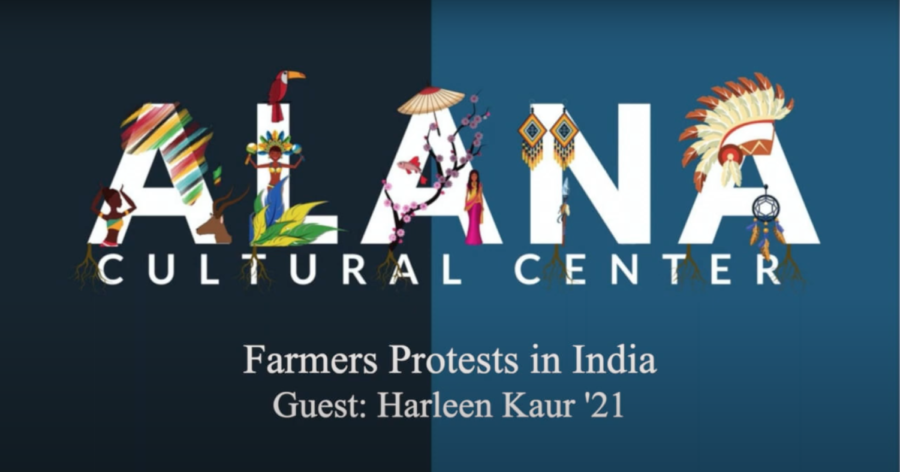ALANA Cultural Center Hosts New “Kinder Culture” Podcast
On Tuesday, March 2, the ALANA Cultural Center released the second episode of “The Kinder Culture,” a podcast series that seeks to create a safe space for Colgate community members to discuss cultural issues. A new episode is released weekly through the WCRU and the ALANA outreach publications. In each 10 to 30-minute episode, Esther Rosbrook, Director of the ALANA Cultural Center, teams up with one or two students to interview faculty, staff and student leaders on the social, economic, religious and political factors at play in current crises.
“The implementation of this podcast is super important to educating many Colgate students on the relevance of pressing global issues,” junior Olivia Geppel said.
The podcast’s debut episode, “Ethiopia: A Current Cultural and Political Crisis,” centers around an interview with Associate Professor of Biology Engda Hagos, who is from Ethiopia himself. Hagos shared his perspectives on the brutal war against the Tigray people by the Ethiopian government and the Eritrean army. The Ethiopian Prime Minister Abiy Ahmed came to power in 2018 and normalized peace with Eritrea, which became independent from Ethiopia in 1993 and began a war with Ethiopia in 1998. Ahmed signed a peace agreement in 2018 and has since invited the Eritrean troops to attack the Ethiopian people. Since Nov. 4, 2020, the invading army has conducted warfare against the Tigray people, one of the 80 different ethnic groups in Ethiopia. Soldiers are gang raping children, mudering people in the streets and conducting an ethnic cleansing that Hagos fears could be the beginning of a genocide. Approximately 2.2 million people have been displaced internally thus far, 62,000 have fled to Sudan and 4.5 million are in need of emergency supplies. The central government has blocked humanitarian aid, internet and most media outlets, cutting the Tigrayan people off from any outside help. The government is also refusing to distribute food and medicine while allowing the army to loot hospitals, schools, homes and small businesses.
“History is repeating itself under the current government of Ethiopia, who pre-planned Tigrayan genocide. We cannot let this happen in 2021. The government must help us take action in a timely and decisive manner by pressuring the government of Ethiopia to stop the war against Tigray; allow humanitarian assistance immediately; allow Tigray to be connected to the rest of the world; reopen banks, telecommunications, the internet and evacuate all invading forces from Tigray,” Hagos said.
Hagos shared his personal fears about the crisis as well, recounting his experience as a refugee in Kenya for eighteen months after fleeing the war in Ethiopia in the 1990s. He speaks of his parents and brother still in Ethiopia, who he has been unable to reach and fears may have been cut off from essential medications. The crisis in Tigray continues to worsen, and Hagos emphasizes the importance of the international community in stopping this massacre.
The second podcast episode, “Farmers Protest in India,” also involves government corruption against an ethnic minority. Esther Rosbrook and student moderator Jaritza Nunez interviewed Harleen Kaur, senior advisor of the South Asian Cultural Club, about the farmers’ peaceful protests against recent legislation in India. Three pieces of legislation were passed that loosened the rules for the sale, pricing and storage of farm produce, which endangered farmers’ livelihoods. Prime Minister Modi claims the laws give the farmers more freedom, but farmers counter that the laws allow large companies to drive down prices. The peaceful protests that are now occurring are mostly taking place in northern Indian in states including Punjab, Haryana and Rajasthan. The government and police have responded with violence, launching tear gas, blocking internet access, charging demonstrators with bamboo sticks and deploying armed officers to the protests.
Kaur believes that the Modi administration knew that the economic repercussions of these laws would hit the minority Sikh community the hardest. Modi comes from the Bharatiya Janata Party, which is often called the Hindu Nationalist Party and has been accused of open discrimination against minorities like Muslims and Sikhs. Kaur asserts that it is essential for the international community to take a stand against this legislation and the government’s response to the protests. Similar to the situation in Ethiopia, the protestors are blocked from communications with the outside world and may not even know if there is aid available. Kaur characterizes this crisis as a brutal, deliberate attempt by the Modi administration to dilute the Sikh identity in Punjab.
In both the massacre of the Tigayan people and the persecution of Sikh farmers, Kaur and Hagos stress that the Colgate community can help. They encourage community members to educate themselves on these issues and spread the word as far and wide as possible. Hagos also suggests the formation of a Colgate committee of students and faculty that can raise funds and provide assistance by sending essential items to affected communities and helping Tigrayan students resume their educations. He and Kaur encourage involvement in local politics, such as writing letters to members of Congress and President Biden’s cabinet. They also direct students to humanitarian organizations like Khalsa Aid, Save Indian Farmers, Ethiopian Red Cross, Amnesty International, Human Rights Watch and Save the Children.
“I strongly believe that we are all connected in many different ways, and by maintaining a self-awareness of what is going on domestically and internationally, we can choose ways to impact those around us,” Rosbrook said.
Rosbrook added that through this podcast and other initiatives, the ALANA Center seeks to create a platform for different cultural issues to come to light and to be discussed by community members. Podcasts are easily accessible to foster the expansion of knowledge and advocacy to hopefully create a “Kinder Culture.”










